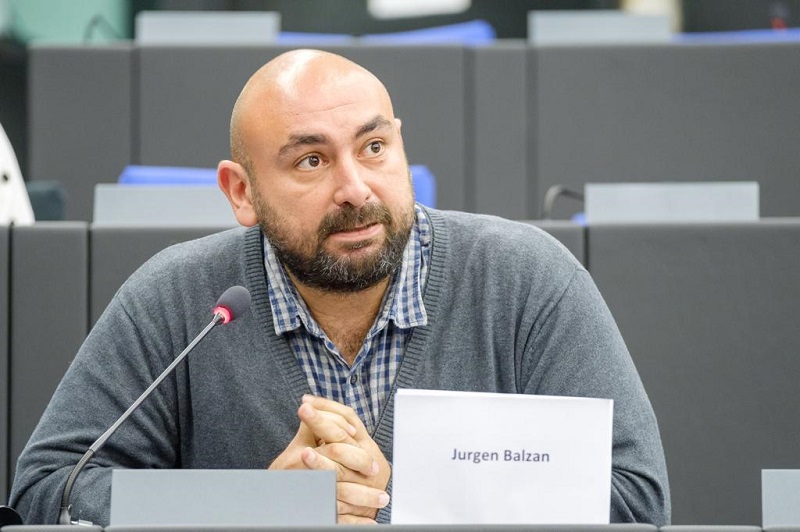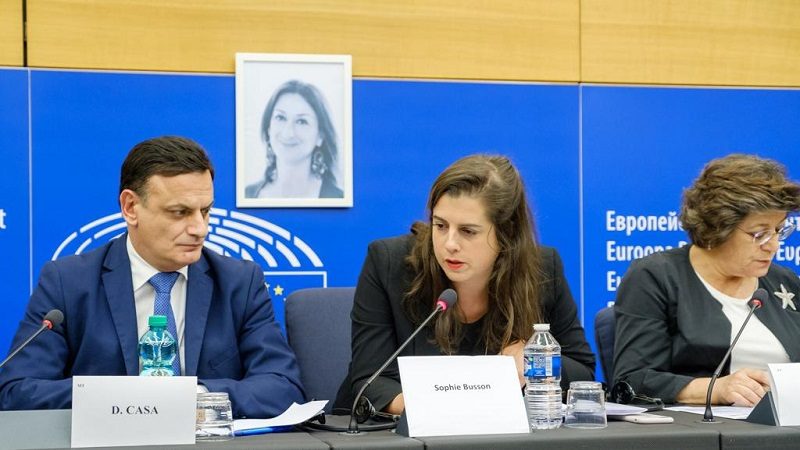If those wishing to silence journalists understand that the consequence of their actions will be public outrage they will think twice before using these abusive practices, PN head of delegation David Casa said during a European Parliament press conference on the need for anti-SLAPP legislation on Wednesday.
The press conference welcomed journalists from different European countries to talk about their experience on the ground when facing such legal threats, including The Shift News’ journalist Jurgen Balzan.
SLAPPs (Strategic Lawsuits Against Public Participation) are intended to intimidate and silence investigative journalists and independent media by burdening them with exorbitant legal expenses until they abandon their stance as a result of the threat of financially crippling lawsuits abroad.
“Headlines were changed. Stories modified. Articles were deleted. More importantly, they influenced future reporting of their wrongdoing,” Casa said referring to the action taken by Pilatus Bank against mainstream media houses in Malta.
“This is not acceptable. These practices have no place in the EU,” he added. “If those wishing to silence journalists understand that the consequence of their actions will be our public outrage they will think twice before using these abusive practices”.
Casa also referred to the threats against assassinated journalist Daphne Caruana Galizia, who did not know when she died that Pilatus Bank had instituted a multi-million-dollar lawsuit against her in Arizona.
Socialist MEP Ana Gomes said the links between “murky” businesses and the lawyers working with them to silence journalists needed to be investigated. She revealed that in a letter sent to MEPs on Tuesday, First Vice-President of the European Commission Frans Timmermans said “the practice of SLAPP is an abuse of defamation laws”.
Jurgen Balzan explained the SLAPP threat from Henley & Partners against The Shift News last Christmas, only a few weeks after the portal was launched. The Shift News refused to remove the article in question, and published the letter sent by the passports firm.
READ MORE: Henley & Partners threatens legal action against The Shift News
Balzan said: “The reason The Shift News was created was to have more freedom. Having our own organisation gave us the freedom to decide not to succumb to threats from big business. But it feels like having a guillotine over your head, not knowing if and when it’s going to chop your head off”.

SLAPP threats in Malta come from two companies – Pilatus Bank and Henley & Partners – that are at the centre of corruption allegations involving top members of government. Henley & Partners chairman Christian Kalin told MEPs he sought the approval of Prime Minister Joseph Muscat before deciding which journalists to sue.
“If journalists cannot investigate the sale of passports in Malta probably we will never know who has been granted EU citizenship. If Maltese journalists cannot investigate the energy deals between the government and Azerbaijan this could have serious implications on the rest of the EU. If journalists cannot investigate money laundering in Malta this could have serious implications on the fight against criminality across the EU,” Balzan said.
READ MORE: Henley & Partners only sues Maltese journalists if government gives its ok
Daphne’s murder, he said, was partly facilitated by the fact that she was left alone as she fought our battles. “I call on European legislators and policy makers not to commit the same mistake we did. Freedom of speech and press freedom are under threat in Malta, the Czech Republic, Slovakia, Hungary and other parts of Europe. It must be protected or the only victors will be those who do not want the truth to be known”.
The debate was chaired by Reporters Without Borders head of advocacy Sophie Busson.
Blogger Manuel Delia also participated in the debate held at the Strasbourg press room named after Daphne Caruana Galizia. He stressed the need for anti-SLAPP legislation, saying Europe had a responsibility to resist such lawsuits that inhibit Europe’s ability to protect its democracy.
In a reply to a parliamentary question submitted by PN head of delegation David Casa, the European Commission stated it was possible to prevent the enforcement of SLAPP judgments in other jurisdictions on the basis of public policy.
The Commission’s position contrasts with that of the Maltese government that rejected an anti-SLAPP amendment proposed by PN MP Jason Azzopardi to the new Media Bill. Justice minister Owen Bonnici had said it was incompatibile with EU law.
Yet the Commission has now stated that an EU member state has a right to legislate against SLAPP originating in a jurisdiction outside the EU, and that EU member states have a right to protect their nationals against SLAPP originating from within the EU as long as it is done in good faith and in line with declared public policy.
Casa said: “It is clear that there is nothing in EU law that precludes measures to protect journalists from these abusive practices in national legislation”.














